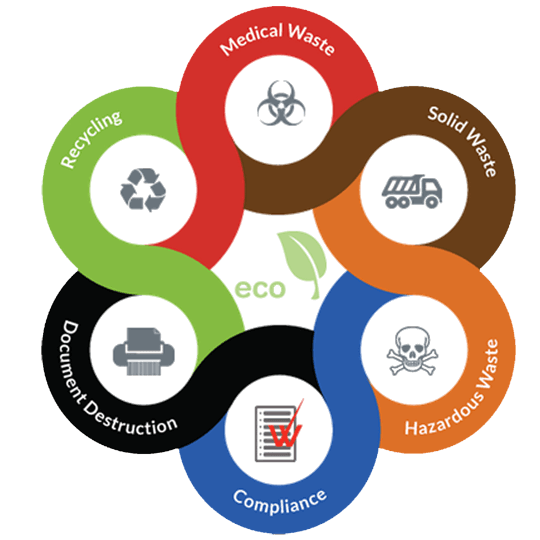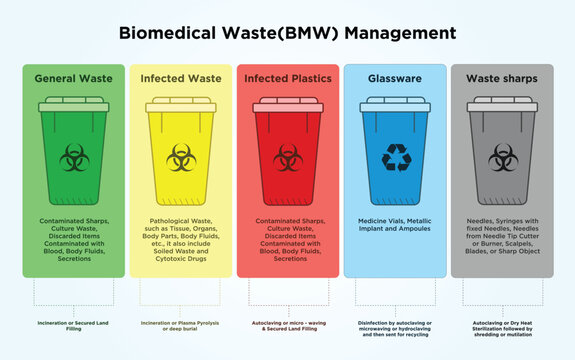The Significance of Correctly Handling Medical Waste
Correct monitoring of clinical waste is of utmost significance in medical care centers. The handling, storage, and disposal of medical waste require rigorous adherence to standards and policies to guarantee the safety and security of individuals, health care workers, and the atmosphere. Healthcare centers have lawful and governing commitments to properly manage medical waste, and failing to conform can result in fines and legal repercussions.
Wellness Risks Associated With Improper Waste Administration
Improper administration of medical waste positions significant health and wellness dangers to both healthcare employees and the public - WasteX Medical Waste Disposal. Clinical waste, which consists of sharps, transmittable materials, drugs, and radioactive materials, calls for correct handling and disposal to stop the spread of infections, injuries, and exposure to hazardous substances
Among the main health and wellness threats linked with inappropriate clinical waste administration is the transmission of transmittable illness. Medical care workers that enter into call with contaminated waste may acquire illness such as HIV, hepatitis, or various other bloodborne virus. Likewise, if clinical waste is not correctly thrown away, it can pollute the environment, water sources, and also food, bring about the spread of diseases within the community.
Inappropriate waste administration can additionally lead to injuries, especially from sharps such as needles, scalpels, and busted glass. Unexpected needle punctures can cause the transmission of bloodborne illness, while cuts from sharp objects can cause severe injuries and infections.
Furthermore, the inappropriate disposal of pharmaceutical waste can bring about the contamination of water materials. When ended or unused medicines are purged down the bathroom or discarded inappropriately, the chemicals can seep right into water resources, influencing aquatic life and possibly entering the human food chain.
Environmental Influence of Incorrectly Disposed Medical Waste
One of the significant effects of insufficient administration of medical waste is its detrimental effect on the atmosphere. Improperly disposed medical waste presents a severe danger to environments, water bodies, and the overall equilibrium of the atmosphere. WasteX Medical Waste Disposal. The harmful materials had in clinical waste, such as contagious agents, pharmaceuticals, and chemicals, can contaminate dirt, water, and air, bring about widespread air pollution and destruction
When clinical waste is not effectively segregated, treated, and disposed of, it can discover its way right into water bodies through inappropriate landfill techniques or unlawful unloading. This can cause the contamination of groundwater and surface water, affecting aquatic life and potentially polluting drinking water resources. The launch of hazardous chemicals and drugs right into the environment can interfere with ecosystems and injury both pet and plant species.
Additionally, inappropriate incineration of clinical waste can release poisonous toxins, consisting of dioxins and furans, right into the environment. These toxins have been linked to various health and wellness problems, including respiratory system problems, reproductive conditions, and also cancer cells. The launch of greenhouse gases during incineration likewise adds to environment adjustment.
To alleviate the ecological effect of poorly disposed medical waste, it is critical to carry out appropriate waste administration practices. This consists of partition of waste at the resource, appropriate treatment approaches, and risk-free disposal methods. By doing so, we can decrease the contamination and protect the setting from the harmful effects of medical waste mismanagement.
Lawful and Governing Responsibilities for Health Care Facilities
In order to deal with the ecological influence of incorrectly disposed medical waste, health care facilities are required to stick to lawful and regulatory obligations. These obligations are implemented to make certain the appropriate handling, storage, transportation, and disposal of clinical waste in a secure and ecologically responsible fashion.
One of the vital legal responsibilities for medical care centers is to get the required permits and licenses for managing clinical waste. This includes getting a waste generator identification number and adhering to government, state, and local laws. Medical care facilities have to likewise maintain comprehensive documents of the types and amounts of clinical waste created, as well as the methods used for its disposal.
In addition, healthcare facilities have to carry out correct partition and product packaging procedures for various types of medical waste, such as sharps, contagious waste, and pharmaceutical waste - medical waste removal service. This consists of utilizing leak-proof containers, biohazard bags, and sharps containers that meet regulatory standards
Health care centers are likewise in charge of guaranteeing that their personnel obtain ideal training on the appropriate handling and disposal of clinical waste. This consists of training on infection control, individual protective equipment, and waste monitoring methods.
Best Practices for Safe Handling and Disposal of Medical Waste
To guarantee the risk-free handling and disposal of medical waste, healthcare facilities should apply best methods. These techniques are vital to protect the health and safety and security of both health care workers and the general public. The appropriate administration of medical waste is critical in preventing the spread of infectious illness and decreasing environmental contamination.
Among the most effective methods for secure handling and disposal of medical waste is segregation. Health care centers need to separate various kinds of medical waste, such as sharps, infectious materials, and pharmaceutical waste, to stop cross-contamination. Correct labeling and shade coding of waste containers also play a crucial function in making certain the proper segregation of medical waste.
Another essential ideal practice is making use of suitable containers for storing and transporting medical waste. These containers need to be leak-proof, puncture-resistant, and appropriately secured to stop any kind of feasible release of unsafe products. Additionally, healthcare centers must develop clear procedures for the collection, storage, and transportation of medical waste to lessen the threat of direct exposure and contamination.
Additionally, medical care centers need to educate their team on the appropriate handling and disposal of medical waste. Routine training sessions and correspondence course need to be performed to keep medical care workers updated on the most up to date guidelines and standards. This will aid guarantee that every person associated with the procedure understands the potential risks and is outfitted with the essential expertise and abilities to take care of medical waste securely.
Education and Training for Healthcare Professionals in Waste Management
Healthcare experts need detailed education and learning and training in waste administration to make sure the proper handling and disposal of medical waste. The administration of clinical waste is an important element of health care operations as it straight affects the health and wellness of both medical care employees and the public. Correct education and learning and training gear up healthcare professionals with the necessary expertise and abilities to deal with and dispose of clinical waste in a ecologically responsible and secure fashion.
Education and training programs for healthcare specialists in waste monitoring cover a series of subjects, including the category and segregation of medical waste, appropriate product packaging and storage space, transportation and labeling demands, and using personal protective tools. These programs likewise highlight the relevance of adherence to regional, nationwide, and global policies and standards governing clinical waste administration.
By obtaining thorough education and learning and training in waste administration, medical care experts can successfully reduce the dangers connected with clinical waste, such as the transmission of infectious diseases and the prospective harm to the setting. WasteX Medical Waste Disposal. Trained specialists can identify and carry out finest practices that promote sustainability and effective waste monitoring practices within medical care centers.
Continuous education and learning and training in waste management must be a recurring priority for medical care professionals, as waste management methods and laws might evolve gradually. By remaining current with the most recent advancements in waste monitoring, healthcare experts can make certain that they are outfitted with the knowledge and abilities required to make informed choices and add to the overall improvement recommended you read of waste monitoring methods in healthcare settings.

Final Thought
In verdict, appropriate management of clinical waste is vital to minimize health and wellness risks and minimize the environmental effect. Medical care centers have regulatory and lawful commitments to ensure secure handling and disposal of clinical waste.

Health care specialists require detailed education and training in waste monitoring to ensure the appropriate handling and disposal of clinical waste - medical waste removal. The monitoring of clinical waste is an essential element of medical care operations as it straight affects the health and wellness and safety of both healthcare workers and the general public